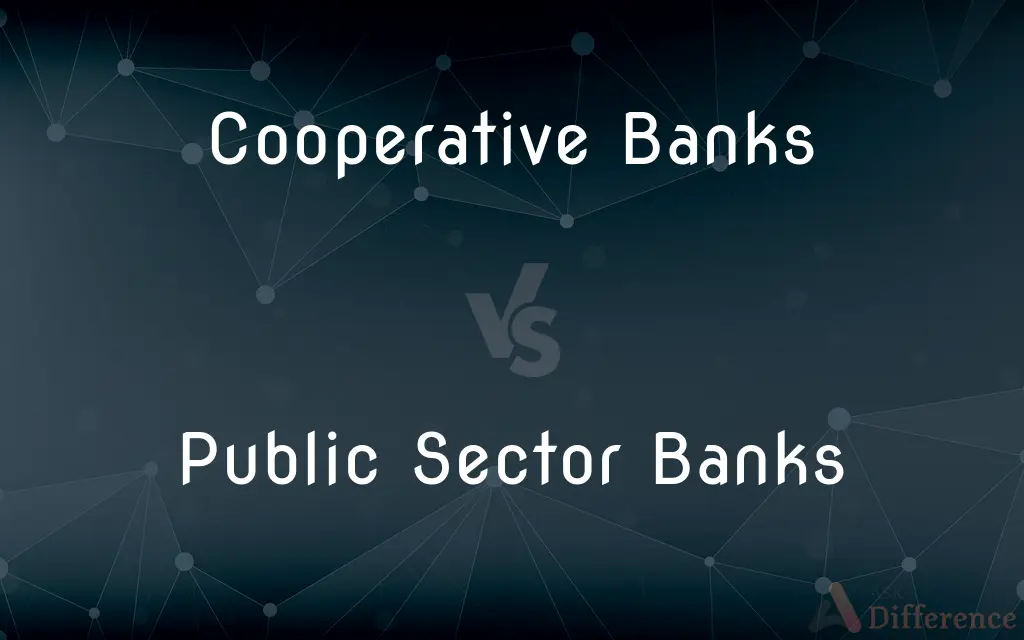Cooperative Banks vs. Public Sector Banks — What's the Difference?
By Tayyaba Rehman — Published on October 14, 2023
Cooperative Banks are member-owned entities catering to local needs; Public Sector Banks are government-owned institutions serving broader regions.

Difference Between Cooperative Banks and Public Sector Banks
Table of Contents
ADVERTISEMENT
Key Differences
Cooperative Banks are financial entities owned and controlled by their members. These members usually share a common affiliation, such as residing in the same geographical region or working in the same industry. In contrast, Public Sector Banks are larger banking institutions owned predominantly or wholly by the government.
While Cooperative Banks focus on local needs, often offering services tailored to a specific community or group, Public Sector Banks provide services on a much broader scale, addressing the requirements of diverse sectors and regions. This distinction in scale and ownership results in varying operational methodologies.
Cooperative Banks, being member-centric, often prioritize the needs of their members, ensuring services and products cater to the local demand. In contrast, Public Sector Banks, being state-owned, operate with a national perspective, having policy-driven goals and often bearing the responsibility of implementing government banking policies.
Given their smaller size and localized focus, Cooperative Banks usually have a limited presence and might not have branches in multiple regions. Public Sector Banks, however, have a wide-reaching presence, both nationally and sometimes internationally, given the substantial backing of the government.
It's noteworthy that while both banks offer similar core banking services, their objectives, governance structures, and scope significantly differ. The Cooperative Banks' primary goal is often member welfare, while Public Sector Banks aim for national economic stability and growth.
ADVERTISEMENT
Comparison Chart
Ownership
Owned and operated by members
Predominantly or wholly owned by the government
Focus
Localized, member-centric services
Broader, national focus
Scale
Smaller, localized operations
Larger operations, with national and sometimes global reach
Governance
Decided by member-elected representatives
Governed by public sector policies and regulations
Objective
Member welfare and localized economic growth
National economic stability and growth
Compare with Definitions
Cooperative Banks
Provide localized, member-centric services.
The Cooperative Banks in the region have special education loan schemes for the local students.
Public Sector Banks
Aim to maintain national economic stability.
During economic downturns, Public Sector Banks play a crucial role in economic revival.
Cooperative Banks
Operate on a smaller scale with a community focus.
The Cooperative Banks often organize community events to gather feedback.
Public Sector Banks
Often backed by substantial governmental assets and resources.
Public Sector Banks are considered more secure due to government ownership.
Cooperative Banks
Governed by member-elected representatives.
The election for the board of the Cooperative Banks is due next month.
Public Sector Banks
Governed by public sector policies and regulations.
Public Sector Banks have to adhere to stringent regulations set by the government.
Cooperative Banks
Aim to cater to the specific needs of their members.
Cooperative Banks often have tailored loan programs for the needs of their community.
Public Sector Banks
Banking institutions owned majorly or entirely by the government.
Public Sector Banks often implement government-backed financial schemes.
Cooperative Banks
Banks owned and managed by its members.
In our town, the Cooperative Banks focus on agricultural loans due to the farming community.
Public Sector Banks
Operate on a national scale with numerous branches.
You can find Public Sector Banks branches even in remote parts of the country.
Common Curiosities
Who owns Cooperative Banks?
Cooperative Banks are owned and managed by their members.
How do Cooperative Banks determine their policies?
Cooperative Banks’ policies are often determined by member-elected representatives based on the needs of the community.
Are Public Sector Banks operated by the government?
Yes, Public Sector Banks are predominantly or wholly owned and operated by the government.
Do Public Sector Banks operate internationally?
Some Public Sector Banks have an international presence, depending on their scale and scope.
Can anyone join a Cooperative Bank?
Typically, membership in Cooperative Banks is based on certain affiliations, like residing in a specific region or being part of a community.
How are Public Sector Banks different from private banks?
Public Sector Banks are government-owned, whereas private banks are owned by private entities or individuals.
Why might someone choose a Cooperative Bank over a Public Sector Bank?
Someone might choose a Cooperative Bank for localized, member-centric services and a community-oriented approach.
Are Public Sector Banks' interest rates determined by the government?
While they operate under government guidelines, Public Sector Banks have autonomy in many operational aspects, including setting interest rates, though they often align with national economic objectives.
What kind of services can you expect from Public Sector Banks?
Public Sector Banks offer a wide range of services, from savings and loans to wealth management and international banking.
Are Cooperative Banks more secure than private banks?
The security of a bank depends on its management and regulations, not just its type. However, Cooperative Banks have local accountability.
Share Your Discovery

Previous Comparison
Cost Of Goods Manufactured vs. Cost Of Goods Sold
Next Comparison
Long Haul vs. Short HaulAuthor Spotlight
Written by
Tayyaba RehmanTayyaba Rehman is a distinguished writer, currently serving as a primary contributor to askdifference.com. As a researcher in semantics and etymology, Tayyaba's passion for the complexity of languages and their distinctions has found a perfect home on the platform. Tayyaba delves into the intricacies of language, distinguishing between commonly confused words and phrases, thereby providing clarity for readers worldwide.
















































